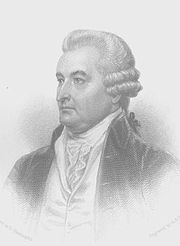
Benjamin Huntington
Encyclopedia

United States
The United States of America is a federal constitutional republic comprising fifty states and a federal district...
lawyer, jurist and politician from Norwich, Connecticut
Norwich, Connecticut
Regular steamship service between New York and Boston helped Norwich to prosper as a shipping center through the early part of the 20th century. During the Civil War, Norwich once again rallied and saw the growth of its textile, armaments, and specialty item manufacturing...
. He served in the Revolutionary War with the rank of General. He later served Connecticut
Connecticut
Connecticut is a state in the New England region of the northeastern United States. It is bordered by Rhode Island to the east, Massachusetts to the north, and the state of New York to the west and the south .Connecticut is named for the Connecticut River, the major U.S. river that approximately...
as a delegate to the Second Continental Congress
Second Continental Congress
The Second Continental Congress was a convention of delegates from the Thirteen Colonies that started meeting on May 10, 1775, in Philadelphia, Pennsylvania, soon after warfare in the American Revolutionary War had begun. It succeeded the First Continental Congress, which met briefly during 1774,...
and as a member of the U.S. House of Representatives
United States House of Representatives
The United States House of Representatives is one of the two Houses of the United States Congress, the bicameral legislature which also includes the Senate.The composition and powers of the House are established in Article One of the Constitution...
during the First United States Congress.
Benjamin was born on April 19, 1736 at Norwich, Connecticut, the only child of Daniel Huntington and his second wife Rachel Wolcott. He married Anne Huntington, of Windham, Connecticut
Windham, Connecticut
Windham is a town in Windham County, Connecticut, United States. It contains the city of Willimantic and the villages of Windham Center, North Windham, and South Windham. The city of Willimantic was consolidated with the town in 1983...
, on May 5, 1765. She died on October 6, 1790 at Norwich. He graduated from Yale in 1761, and soon after, he entered upon the practice of law in his native town, and rose rapidly to the front rank of his profession. He seems to have been unusually devoted to his profession, being at once a severe student, and an active and successful advocate and business man. Though rather shunning than courting public life, he was not allowed to excuse himself from its claims; nor, when called to meet them, did he shrink either from public duties or dangers. In 1775 he was appointed, by the legislature of his native State, on the committee of safety, appointed to advise with the Governor of the State during the recess of the legislature. Only the ablest men and truest patriots of that trying day, would have been put upon that important committee. Again, in 1778, on the recommendation of George Washington
George Washington
George Washington was the dominant military and political leader of the new United States of America from 1775 to 1799. He led the American victory over Great Britain in the American Revolutionary War as commander-in-chief of the Continental Army from 1775 to 1783, and presided over the writing of...
, he was appointed by the legislature, one of the delegates to the convention to be held in New Haven, for the regulation of the army. From 1780 to 1784, and again in 1787 and 1788, he was a member of the Continental Congress; and when the new government went into operation, in 1789, he was chosen to represent Connecticut in the First Congress of the United States
United States
The United States of America is a federal constitutional republic comprising fifty states and a federal district...
.
From 1781 to 1790, and also from 1791 to 1793 he was also a member of the upper house of the Connecticut Legislature. On the incorporation of Norwich, Connecticut
Norwich, Connecticut
Regular steamship service between New York and Boston helped Norwich to prosper as a shipping center through the early part of the 20th century. During the Civil War, Norwich once again rallied and saw the growth of its textile, armaments, and specialty item manufacturing...
, in 1784, he was chosen, for an indefinite period, its first Mayor
Mayor
In many countries, a Mayor is the highest ranking officer in the municipal government of a town or a large urban city....
, in which office he served until his formal resignation, in 1796. He was also appointed in 1793, a judge of the superior court of Connecticut, holding this office until 1798. Thus, for more than twenty years, during the most eventful period of United States history, he was continually serving his constituents in offices always onerous, and often hazardous. How well he discharged these trusts, their own recurrence will unequivocally evince. A word on this point, however, is due both to his memory and to the truth of American revolutionary history.

